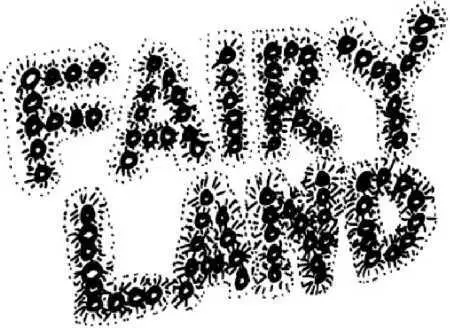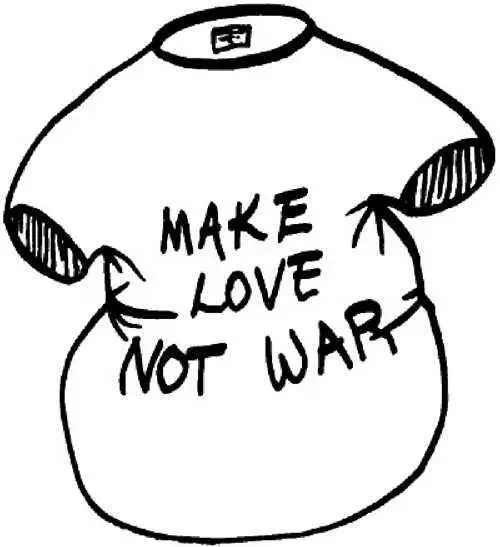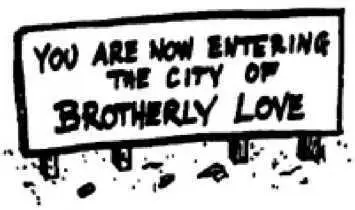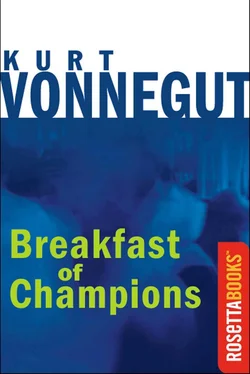His bad chemicals let him cross the lobby and then the cocktail lounge, which wasn’t open yet, without experiencing anything strange. But when he stepped out of the side door of the cocktail lounge, and onto the asphalt prairie which surrounded both his Inn and his Pontiac agency, he discovered that someone had turned the asphalt into a sort of trampoline.
It sank beneath Dwayne’s weight. It dropped Dwayne to well below street level, then slowly brought him only partway up again. He was in a shallow, rubbery dimple. Dwayne took another step in the direction of his automobile agency. He sank down again, came up again, and stood in a brand new dimple.
He gawked around for witnesses. There was only one. Cyprian Ukwende stood on the rim of the dimple, not sinking in. This was all Ukwende had to say, even though Dwayne’s situation was extraordinary:
“Nice day.”
Dwayne progressed from dimple to dimple.
He blooped across the used car lot now.
He stopped in a dimple, looked up at another young black man. This one was polishing a maroon 1970 Buick Skylark convertible with a rag. The man wasn’t dressed for that sort of work. He wore a cheap blue suit and a white shirt and a black necktie. Also: he wasn’t merely polishing the car—he was burnishing it.
The young man did some more burnishing. Then he smiled at Dwayne blindingly, then he burnished the car again.
Here was the explanation: this young black man had just been paroled from the Adult Correctional Institution at Shepherdstown. He needed work right away, or he would starve to death. So he was showing Dwayne how hard a worker he was.
He had been in orphanages and youth shelters and prisons of one sort or another in the Midland City area since he was nine years old. He was now twenty-six.
He was free at last!
Dwayne thought the young man was an hallucination.
The young man went back to burnishing the automobile. His life was not worth living. He had a feeble will to survive. He thought the planet was terrible, that he never should have been sent there. Some mistake had been made. He had no friends or relatives. He was put in cages all the time.
He had a name for a better world, and he often saw it in dreams. Its name was a secret. He would have been ridiculed, if he had said its name out loud. It was such a childish name.
The young black jailbird could see the name any time he wanted to, written in lights on the inside of his skull. This is what it looked like:

He had a photograph of Dwayne in his wallet. He used to have photographs of Dwayne on the walls of his cell at Shepherdstown. They were easy to get, because Dwayne’s smiling face, with his motto underneath, was a part of every ad he ran in the Bugle-Observer. The picture was changed every six months. The motto hadn’t varied in twenty-five years.
Here was the motto:
ASK ANYBODY—
YOU CAN TRUST DWAYNE.
The young ex-convict smiled yet again at Dwayne. His teeth were in perfect repair. The dental program at Shepherdstown was excellent. So was the food.
“Good morning, sir,” said the young man to Dwayne. He was dismayingly innocent. There was so much he had to learn. He didn’t know anything about women, for instance. Francine Pefko was the first woman he had spoken to in eleven years.
“Good morning,” said Dwayne. He said it softly, so his voice wouldn’t carry very far, in case he was conversing with an hallucination.
“Sir—I have read your ads in the newspapers with great interest, and I have found pleasure in your radio advertising, too,” the parolee said. During the last year in prison, he had been obsessed by one idea: that he would work for Dwayne someday, and live happily ever after. It would be like Fairyland.
Dwayne made no reply to this, so the young man went on: “I am a very hard worker, sir, as you can see. I hear nothing but good things about you. I think the good Lord meant for me to work for you.”
“Oh?” said Dwayne.
“Our names are so close,” said the young man, “it’s the good Lord telling us both what to do.”
Dwayne Hoover didn’t ask him what his name was, but the young man told him anyway, radiantly: “My name, sir, is Wayne Hoobler.”
All around Midland City, Hoobler was a common Nigger name.
Dwayne Hoover broke Wayne Hoobler’s heart by shaking his head vaguely, then walking away.
Dwayne entered his showroom. The ground wasn’t blooping underneath him anymore, but now he saw something else for which there could be no explanation: A palm tree was growing out of the showroom floor. Dwayne’s bad chemicals made him forget all about Hawaiian Week. Actually, Dwayne had designed the palm tree himself. It was a sawed-off telephone pole—swaddled in burlap. It had real coconuts nailed to the top of it. Sheets of green plastic had been cut to resemble leaves.
The tree so bewildered Dwayne that he almost swooned. Then he looked around and saw pineapples and ukuleles scattered everywhere.
And then he saw the most unbelievable thing of all: His sales manager, Harry LeSabre, came toward him leeringly, wearing a lettuce-green leotard, straw sandals, a grass skirt, and a pink T-shirt which looked like this:

Harry and his wife had spent all weekend arguing about whether or not Dwayne suspected that Harry was a transvestite. They concluded that Dwayne had no reason to suspect it. Harry never talked about women’s clothes to Dwayne. He had never entered a transvestite beauty contest or done what a lot of transvestites in Midland City did, which was join a big transvestite club over in Cincinnati. He never went into the city’s transvestite bar, which was Ye Old Rathskeller, in the basement of the Fairchild Hotel. He had never exchanged Polaroid pictures with any other transvestites, had never subscribed to a transvestite magazine.
Harry and his wife concluded that Dwayne had meant nothing more than what he said, that Harry had better put on some wild clothes for Hawaiian Week, or Dwayne would can him.
So here was the new Harry now, rosy with fear and excitement. He felt uninhibited and beautiful and lovable and suddenly free.
He greeted Dwayne with the Hawaiian word which meant both hello and goodbye. “Aloha,” he said.
Kilgore Trout was far away, but he was steadily closing the distance between himself and Dwayne. He was still in the truck named Pyramid. It was crossing a bridge named in honor of the poet Walt Whitman. The bridge was veiled in smoke. The truck was about to become a part of Philadelphia now. A sign at the foot of the bridge said this:

As a younger man, Trout would have sneered at the sign about brotherhood—posted on the rim of a bomb crater, as anyone could see. But his head no longer sheltered ideas of how things could be and should be on the planet, as opposed to how they really were. There was only one way for the Earth to be, he thought: the way it was.
Everything was necessary. He saw an old white woman fishing through a garbage can. That was necessary. He saw a bathtub toy, a little rubber duck, lying on its side on the grating over a storm sewer. It had to be there.
And so on.
The driver mentioned that the day before had been Veterans’ Day. “Um,” said Trout.
Читать дальше













